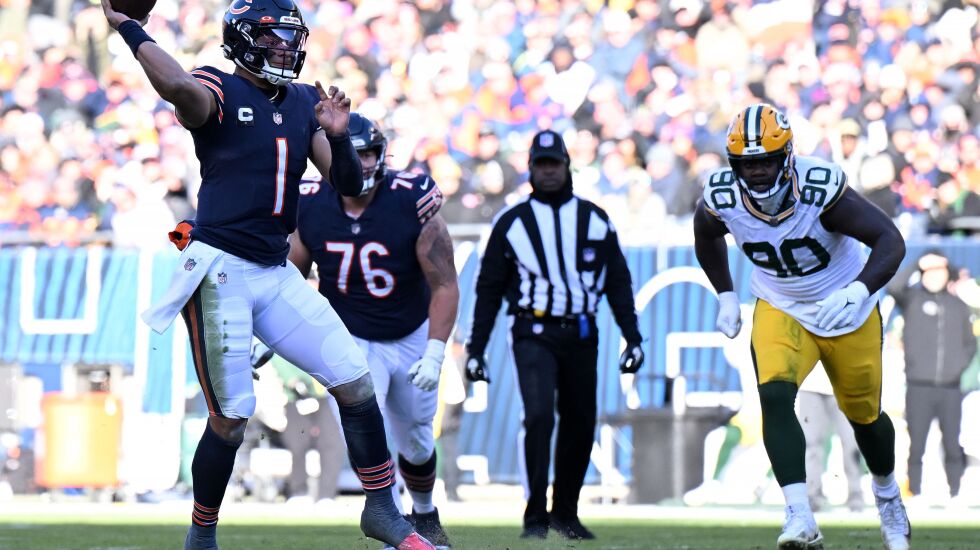
Bears quarterback Justin Fields said last season he didn’t intend on rushing for 1,000 yards again.
The rest of the NFL doesn’t intend to let him.
After a season in which he ran for 1,143 yards — the second-most ever by a quarterback — but finished last in yards passing at 149.5 per game, Fields should expect every defense to go all out to confine him to the pocket. That already started last season, but it’s going to be predominant going forward, starting with the Packers when they come to town Sunday for the season opener.
As former Packers Pro Bowl cornerback Tramon Williams said of Mitch Trubisky four years ago, they’ll force Fields “to play quarterback.” When that strategy worked, everyone copied it and Trubisky unraveled.
“That’s fine with me,” Fields said of that potential approach.
And if Fields has truly made the strides he and the Bears claim he has, that shouldn’t be a problem, should it? It’d actually be to his advantage, theoretically.
“When you try to take away something, you open up something else,” coach Matt Eberflus said. “Certainly with him, taking away that run game for him is something that people did last year and should open up different avenues for us.”
It didn’t last season. The only thing the Bears could do was run, whether with Fields or the running backs.
Whether the Bears are able to exploit that now will depend on how much has actually changed since then. They’ve been touting a multitude of reasons why they’ll be better this season, but every team says that until the games start. That’s the truth serum.
The Bears went into last season with Darnell Mooney as their only good wide receiver, and now they’ve added DJ Moore and Chase Claypool. Of all the improvements the Bears keep pointing to, Moore is a definite. From the day he set foot on the practice field it’s been clear he’s a difference maker.
The offensive line figures to be sturdier after adding first-round pick Darnell Wright at right tackle and $30 million free agent Nate Davis at right guard.
If Bears general manager Ryan Poles proves to be right about all those additions, it changes the entire game for Fields. He’ll suddenly have time and options, two luxuries he didn’t have last season.
But all of those upgrades will be diluted if Fields hasn’t progressed as a passer. Personnel deficiencies were a major factor, but they weren’t the entire equation for how he finished 29th in completion percentage (60.4), 24th in passer rating (85.2) and threw 11 interceptions in 318 passes. For context, Patrick Mahomes threw twice as many passes and only had one more interception.
Regardless of the Bears’ injection of talent, it still comes down to Fields and how he handles teams making him pass to get downfield.
“Whatever the defense presents, whichever way they’re gonna allow us to beat them, that’s what we’re gonna do,” he said. “Whatever I have to do for this team to win, that’s what I’m gonna do. I’ll just go about it like that.”
None of it should be surprising for Fields after seeing signs of it last season and having months to anticipate it for this season. He was up and down in practice leading up to this, but quarterbacks coach Andrew Janocko praised his growth in “overall awareness of what we are doing and what defenses are trying to do to him.”
There’s never been a question about Fields’ talent; he’s an incredible runner and he has a great arm. That’s why he soared to the top of college football and went No. 11 in the draft. This is the time for him to put it all together, right as the Bears approach a key decision on whether to extend his contract or draft their next quarterback.
The enormous upside for Fields is that if he actually is able to thrive as a pocket passer, he’ll light teams up until they adjust to a more balanced scheme. This should be exactly what he wants. And once they do that, he can keep them constantly off balanced and leverage their uncertainty — they’ll never fully ignore him as a running threat — to his advantage.
That’s a big step toward becoming an elite quarterback. If Fields becomes a quarterback who can pick apart a secondary or sprint for the open field, that would be difficult for any defense to stop. It’d be something the Bears have struggled to find for decades.







